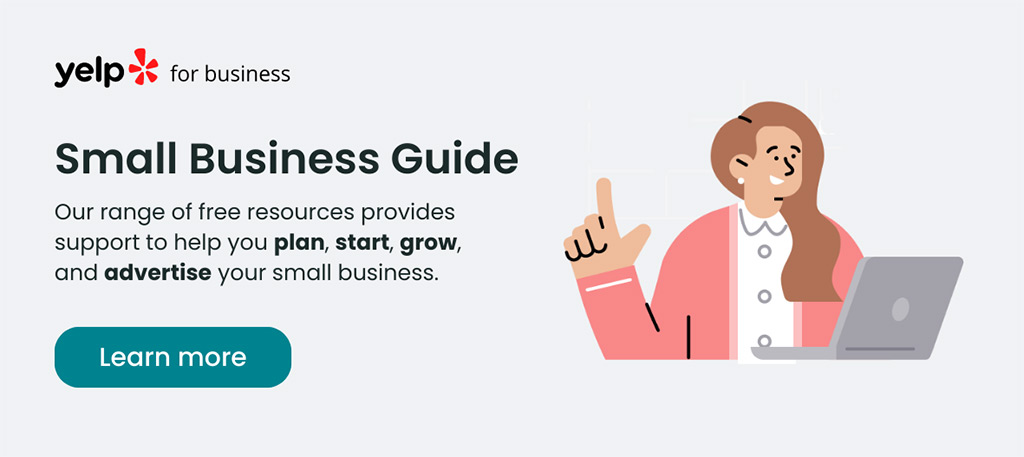The ultimate guide to starting a small business

Bringing a great small business idea to life can be intimidating, but having the right information from the start can make all the difference. This guide puts the tools at your fingertips, helping you cut down the research required to bring your vision to life. Explore nine steps that explain the entrepreneurial journey from initial market research to creating custom brand guidelines that wow potential customers.
1. Conducting market research
Market research helps you identify your target audience—the ideal customer base who will buy your product or service—and provides valuable information about your competitors. You can perform market research on your own (by conducting interviews or surveys) or search the internet for third-party research related to your industry. Every bit of information gathered can help you avoid costly mistakes, like marketing to the wrong demographics.
Benefits of market research
- Discover new business opportunities
- Reduce business risks by knowing customer preferences and competitors
- Improve the effectiveness of marketing materials and brand messaging
- Learn how and where to reach your target audience with advertising
- Set short- and long-term goals tailored to your business and customers
- Simplify decision-making with data and facts
Researching your market and customers will save you time, money, and the hassle as you start to build your business. Read more about market research and the tools available to you in “How to do market research with a small business budget.”
2. Creating a business plan
A successful business plan specifies your products or services, goals, and strategies for growth and elaborates on how to capitalize on your business model. It’s also the document that will help investors or lenders decide if they want to finance you (should you require business financing).
There are two types of business plans—traditional and lean startup. A traditional business plan will be longer, include formal documents, and typically follow this standard structure:
- Executive summary
- Business description
- Business and management structure
- Products and services
- Marketing plan
- Business financial analysis
A lean startup plan is shorter and usually takes less time to complete. It typically includes:
- Key partnerships
- Key activities
- Key resources
- Value proposition
- Customer relationships
- Customer segments
- Channels
- Cost structure
- Revenue streams
To learn which plan is best for your business, read “How to write a business plan and why you need one.”
3. Setting business goals
Setting clear goals for your business will help you visualize what kind of company you want to be and how you want to get there. Think of it as a business roadmap.
First, perform a SWOT analysis to identify what you do best, what could improve, where opportunities lie, and what hurdles stand in your way:
- Strengths. What is your business adept at?
- Weaknesses. Where could your business improve?
- Opportunities. Where does your business have the potential to grow?
- Threats. What are the challenges facing your business’ success?
Armed with this information, you’re ready to start defining your goals. To make your brainstorm session more effective, try using the SMART method:
- Specific. Define your goal as specifically as possible. What needs to be done, who will do it, and how will they do it?
- Measurable. Set trackable benchmarks so you can measure success. What metrics will indicate progress?
- Achievable. Is the goal realistic? What hurdles are in your way, and how will you overcome them?
- Relevant. How is the goal relevant to what you’d like to achieve on a larger scale?
- Timely. What is the timeline for achieving the goal, including any milestones along the way?
4. Understanding business costs
As the adage goes: “You need to spend money to make money.” In terms of starting a small business, this means having the funds to cover your startup costs, like rent, staff salaries, and any operational or accounting software, equipment, or inventory you need.
Costs can vary widely between businesses (an online store will typically have different needs than a brick-and-mortar location), so it’s important to have a solid idea of what your cash flow will be before asking for funding or announcing your grand opening. The U.S. Small Business Administration (SBA) offers a helpful startup costs calculator to provide insight into how much money you’ll need to get started and how long it will take to turn a profit.
While researching costs, also start to think about how you’ll build business credit, which will be important for securing small business loans and optimal business insurance rates.
Knowing how much money you’ll need before day one is crucial to any small business’s future success. Read “How to prepare for your small business startup costs” to give yourself a head start on the process.
5. Choosing a business structure
To register your business with your state and local governments, you’ll first need to pick your business structure, the legal designation of your company that will determine how you are taxed by the IRS, types of funding you can pursue, documentation you must submit, and your personal liability as a business owner.
There are four main business structures:
- Sole proprietorship. One owner (the sole proprietor) assumes personal liability for the business, which is not a separate entity from the owner.
- Partnership. Two or more people share ownership of a business and can determine the levels of liability through general, limited, and joint venture partnership models.
- Limited liability company. One or more owners are considered self-employed, separate entities from the business, and do not assume personal liability.
- Corporation. One or more owners are not personally liable for the business, and the type of corporation (e.g., C corp, S corp, B corp, close corporation, nonprofit) determines how the business is taxed.
Depending on the structure you choose, you’ll require various types of business insurance, such as general liability insurance, product liability insurance, or home-based business insurance. Of note, the federal government requires every business with employees to have workers’ compensation, unemployment, and disability insurance.
During this time, you’ll also want to register your business name and, potentially, a DBA (doing business as) designation. Requirements for DBA vary, so check with your state and local government offices to receive the most accurate information.
Each business structure comes with its own regulations and benefits. Learn more about which business structure is best for you in “How to register your business: a beginner’s guide.”
6. Securing small business funding
Many small businesses, whether startup, ecommerce, or physical stores, require funding to get off the ground, but it can be difficult to know where to look and what is right for your business. Fortunately, there are many options available for entrepreneurs, including:
- Angel investors. High-net-worth individuals willing to fund your business in exchange for ownership equity.
- Bank loans. Loans from traditional financial institutions that rely on established credit history.
- SBA loans. Small business loans backed by the SBA, which allow lenders to assume larger amounts of risk than with traditional bank loans.
- Small business grants. Funding granted to small businesses that does not need to be repaid later.
- Venture capital. Private equity from organizations that invest in companies they perceive as having long-term growth potential.
- Crowdfunding. Funding received in smaller amounts from a large number of individuals via crowdfunding websites or social media. Very popular with small startups.
For a detailed explanation of funding options and breakdown of common financing terminology, read “Tips for financing your small business and pitching investors.”
7. Acquiring business licenses
Every business requires at least one license to legally operate, and each county imposes different penalties for doing business without one. Prior to opening, you might want to consult an attorney to ensure you apply for every business license required by local, state, and federal government. This can help you avoid potential fines, late fees, and denial of operation in the future.
Steps to acquiring your business license:
- Form your business entity or legal structure (e.g., LLC, corporation, sole proprietor)
- Apply for an employer identification number or tax ID (which will allow you to open a business bank account)
- Determine which licenses you will need to operate by either hiring an attorney or inquiring with the SBA, your Secretary of State office, Department of Revenue, or similar government office
- Based on the information gathered in step 3, file for your license(s) with relevant state, county, and local government agencies
- Be sure to renew your license(s) and any applicable permits at their specified times
Once you have the right types of business licenses and permits, you’re legally allowed to operate. Read more about this important step in “How to obtain a business license.”
8. Choosing pricing strategies
A pricing strategy is the method by which you price your products or services for sale, informed by market conditions, your customer base, and competitors. How you price will determine how your company is viewed. For example, if you price below market value, your company might become known as a bargain option, while pricing above market value could lead to your business being seen as a luxury brand.
There is a delicate balance that must be considered, however, and not all pricing strategies will fit every type of business. Before choosing a strategy, consider your business goals, such as:
- Becoming a market leader
- Maximizing your profit margin
- Keeping your business afloat in an unstable market
- Achieving sales growth
- Deterring competition
- Becoming a luxury brand
To learn more about the different pricing strategies, including their pros and cons, and which might fit your business best, read “12 types of pricing strategies to meet your business goals.”
9. Branding your small business
Building a strong brand is key to defining an identity that attracts potential customers and turns them into repeat customers. Branding is more than a logo. It includes everything from your mission statement to your brand elements, including your fonts, colors, and even your business name. It’s everything that evokes a feeling in the customer and makes them remember you over your competitors.
Consider the following when developing your brand:
- What feels authentic to you and how you’ll run your business?
- How will you make an emotional connection with your customers?
- How will you stand out from your competition?
- Will your branding appeal to your target audience?
Once you’ve defined your brand, create brand guidelines to ensure consistency no matter where your brand is present. To build a strong attachment to your brand, customers need to be exposed to it repeatedly, like through social media, digital ads, or your online business website. Learn how to build loyalty and differentiate yourself from the competition in “Small business branding: how to stand out in your industry.”
From a great idea to a successful reality
Starting a business takes time and careful planning. By following the steps above, you’ll set yourself up for success and check the biggest tasks off your list. From finding your niche to securing funding to creating a brand customers will keep coming back for, you have the tools you need to bring your business idea to life.
Once you’re up and running, add or claim your Yelp Business Page to engage with customers and strengthen your online reputation.

The information above is provided for educational and informational purposes only. It is not intended to be a substitute for professional advice and may not be suitable for your circumstances. Unless stated otherwise, references to third-party links, services, or products do not constitute endorsement by Yelp.


